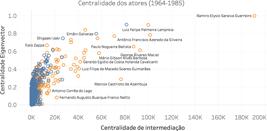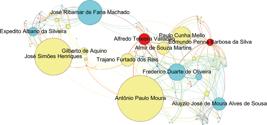ABSTRACT
This article presents the usefulness of network analysis for understanding agents and political arenas of Brazilian foreign policy from 1930 to 1985. To this end, it uses an original database with 953 events comprising 3,731 participants. The study’s argumentation is that Brazilian foreign policy was molded by a broad range of agents and institutions. On the one side, the Ministry for Foreign Relations did not hold a monopoly on the arena. On the other side, in spite of being a minority, diplomats became the central agents in the network. The analysis presents a broad variation of institutional engagement depending on time frames and themes. This conclusion indicates the difficulty in conceiving generalized formulas to explain the characteristics of Brazilian foreign policy. The argumentation centers on the fact that the understanding of the relationship basis of the country’s foreign policy is useful to complement the study of intrinsic characteristics of agents, institutions and arenas. This empirical and theoretical effort can be used to examine other public policies.
foreign policy analysis; brazilian foreign policy; networks; agents

 Thumbnail
Thumbnail
 Thumbnail
Thumbnail
 Thumbnail
Thumbnail
 Thumbnail
Thumbnail
 Thumbnail
Thumbnail
 Thumbnail
Thumbnail
 Thumbnail
Thumbnail
 Thumbnail
Thumbnail
 Thumbnail
Thumbnail
 Fonte: Elaborado pelos autores, utilizando a base de dados disponível no link https://doi.org/10.7910/DVN/3556RW.
Fonte: Elaborado pelos autores, utilizando a base de dados disponível no link https://doi.org/10.7910/DVN/3556RW.
 Fonte: FARIAS, Rogério de Souza; CARMO, Géssica Fernando do. (2020), “Replication Data for: ‘Atores, Eventos e Redes da Política Externa Brasileira (1930-1985)’”, Harvard Dataverse.
Fonte: FARIAS, Rogério de Souza; CARMO, Géssica Fernando do. (2020), “Replication Data for: ‘Atores, Eventos e Redes da Política Externa Brasileira (1930-1985)’”, Harvard Dataverse.
 Fonte: FARIAS, Rogério de Souza; CARMO, Géssica Fernando do. (2020), “Replication Data for: ‘Atores, Eventos e Redes da Política Externa Brasileira (1930-1985)’”, Harvard Dataverse.
Fonte: FARIAS, Rogério de Souza; CARMO, Géssica Fernando do. (2020), “Replication Data for: ‘Atores, Eventos e Redes da Política Externa Brasileira (1930-1985)’”, Harvard Dataverse.
 Fonte: FARIAS, Rogério de Souza; CARMO, Géssica Fernando do. (2020), “Replication Data for: ‘Atores, Eventos e Redes da Política Externa Brasileira (1930-1985)’”, Harvard Dataverse.
Fonte: FARIAS, Rogério de Souza; CARMO, Géssica Fernando do. (2020), “Replication Data for: ‘Atores, Eventos e Redes da Política Externa Brasileira (1930-1985)’”, Harvard Dataverse.
 Fonte: FARIAS, Rogério de Souza; CARMO, Géssica Fernando do. (2020), “Replication Data for: ‘Atores, Eventos e Redes da Política Externa Brasileira (1930-1985)’”, Harvard Dataverse.
Fonte: FARIAS, Rogério de Souza; CARMO, Géssica Fernando do. (2020), “Replication Data for: ‘Atores, Eventos e Redes da Política Externa Brasileira (1930-1985)’”, Harvard Dataverse.
 Fonte: FARIAS, Rogério de Souza; CARMO, Géssica Fernando do. (2020), “Replication Data for: ‘Atores, Eventos e Redes da Política Externa Brasileira (1930-1985)’”, Harvard Dataverse.
Fonte: FARIAS, Rogério de Souza; CARMO, Géssica Fernando do. (2020), “Replication Data for: ‘Atores, Eventos e Redes da Política Externa Brasileira (1930-1985)’”, Harvard Dataverse.
 Fonte: FARIAS, Rogério de Souza; CARMO, Géssica Fernando do. (2020), “Replication Data for: ‘Atores, Eventos e Redes da Política Externa Brasileira (1930-1985)’”, Harvard Dataverse.
Fonte: FARIAS, Rogério de Souza; CARMO, Géssica Fernando do. (2020), “Replication Data for: ‘Atores, Eventos e Redes da Política Externa Brasileira (1930-1985)’”, Harvard Dataverse.
 Fonte: FARIAS, Rogério de Souza; CARMO, Géssica Fernando do. (2020), “Replication Data for: ‘Atores, Eventos e Redes da Política Externa Brasileira (1930-1985)’”, Harvard Dataverse.
Fonte: FARIAS, Rogério de Souza; CARMO, Géssica Fernando do. (2020), “Replication Data for: ‘Atores, Eventos e Redes da Política Externa Brasileira (1930-1985)’”, Harvard Dataverse.
 Fonte: FARIAS, Rogério de Souza; CARMO, Géssica Fernando do. (2020), “Replication Data for: ‘Atores, Eventos e Redes da Política Externa Brasileira (1930-1985)’”, Harvard Dataverse.
Fonte: FARIAS, Rogério de Souza; CARMO, Géssica Fernando do. (2020), “Replication Data for: ‘Atores, Eventos e Redes da Política Externa Brasileira (1930-1985)’”, Harvard Dataverse.